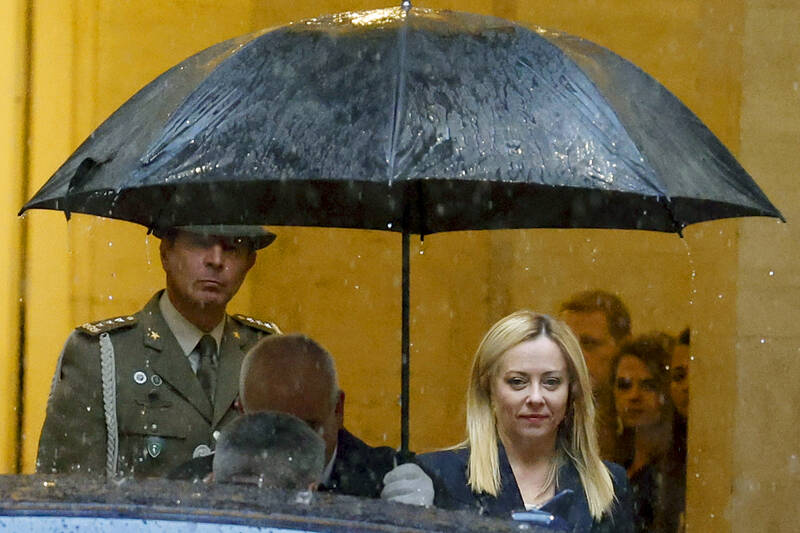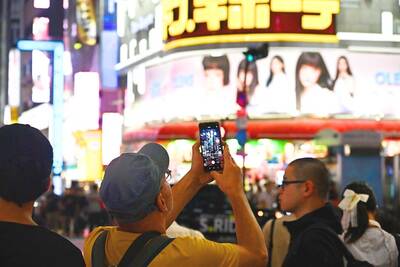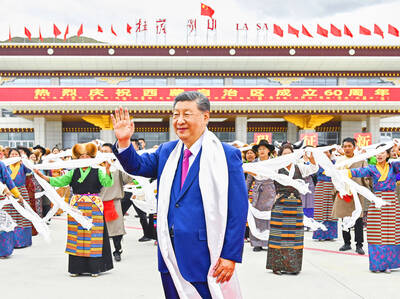Italy is highly unlikely to renew its Belt and Road Initiative (BRI) deal with China, which expires early next year, but needs time to discuss the issue with Beijing, a senior Italian government official said.
The official, who has knowledge of internal discussions over the matter, said a formal decision would not be made ahead of this month’s G7 summit in Japan, adding that it was highly sensitive topic.
Italian Prime Minister Giorgia Meloni’s office declined to comment.

Photo: EPA-EFE
Italy in 2019 became the first and so far only G7 member state to join the hugely ambitious Chinese program, which critics said would enable Beijing to gain control of sensitive technologies and vital infrastructure.
Then-Italian prime minister Giuseppe Conte hoped the deal would give a lift to Italy’s underperforming economy, but over the past four years it has seen little benefit, with exports to China totaling 16.4 billion euros (US$18.1 billion) last year, compared with 13 billion euros in 2019.
By contrast, Chinese imports from Italy increased to 57.5 billion euros from 31.7 billion euros over the same period, Italian government data showed.
Italy’s main eurozone trading partners France and Germany exported significantly more to China last year, despite not being part of Beijing’s infrastructure program.
The government official said Rome would use this lack of economic development as an argument for not renewing the deal.
The pact expires in March next year and would be automatically renewed unless either side informs the other that it is pulling out at least three months before the expiry date.
In an interview with Reuters last year, before she became prime minister after a September election, Meloni made clear she disapproved of Conte’s decision.
“There is no political will on my part to favor Chinese expansion into Italy or Europe,” she said.
Meloni has been keen to burnish her credentials as a committed pro-NATO, pro-Atlantic leader, catching the eyes of Western allies with robust, vocal support for Ukraine.
However, she has been careful not to offend China, and government officials said Rome did not want to cause a diplomatic rupture.
China had to remain a partner, but Italy could not get into a situation in which it was overreliant on Beijing in any key sector, as had happened with Russia and its energy supplies, a second official said.
Meloni met Chinese President Xi Jinping (習近平) in Indonesia in November last year and accepted an invitation to visit China, but a date has not yet been fixed.
Meloni has also not yet visited Washington, and the government official said she did not want to travel to Beijing without having first been received by US President Joe Biden.

Ten cheetah cubs held in captivity since birth and destined for international wildlife trade markets have been rescued in Somaliland, a breakaway region of Somalia. They were all in stable condition despite all of them having been undernourished and limping due to being tied in captivity for months, said Laurie Marker, founder of the Cheetah Conservation Fund, which is caring for the cubs. One eight-month-old cub was unable to walk after been tied up for six months, while a five-month-old was “very malnourished [a bag of bones], with sores all over her body and full of botfly maggots which are under the

BRUSHED OFF: An ambassador to Australia previously said that Beijing does not see a reason to apologize for its naval exercises and military maneuvers in international areas China set off alarm bells in New Zealand when it dispatched powerful warships on unprecedented missions in the South Pacific without explanation, military documents showed. Beijing has spent years expanding its reach in the southern Pacific Ocean, courting island nations with new hospitals, freshly paved roads and generous offers of climate aid. However, these diplomatic efforts have increasingly been accompanied by more overt displays of military power. Three Chinese warships sailed the Tasman Sea between Australia and New Zealand in February, the first time such a task group had been sighted in those waters. “We have never seen vessels with this capability

A Japanese city would urge all smartphone users to limit screen time to two hours a day outside work or school under a proposed ordinance that includes no penalties. The limit — which would be recommended for all residents in Toyoake City — would not be binding and there would be no penalties incurred for higher usage, the draft ordinance showed. The proposal aims “to prevent excessive use of devices causing physical and mental health issues... including sleep problems,” Mayor Masafumi Koki said yesterday. The draft urges elementary-school students to avoid smartphones after 9pm, and junior-high students and older are advised not

Chinese President Xi Jinping (習近平) attended a grand ceremony in Lhasa yesterday during a rare visit to Tibet, where he urged “ethnic unity and religious harmony” in a region where China is accused of human rights abuses. The vast high-altitude area on the country’s western edge, established as an autonomous region in 1965 — six years after the 14th Dalai Lama fled into exile — was once a hotbed for protest against Chinese Communist Party rule. Rights groups accuse Beijing’s leaders of suppressing Tibetan culture and imposing massive surveillance, although authorities claim their policies have fostered stability and rapid economic development in